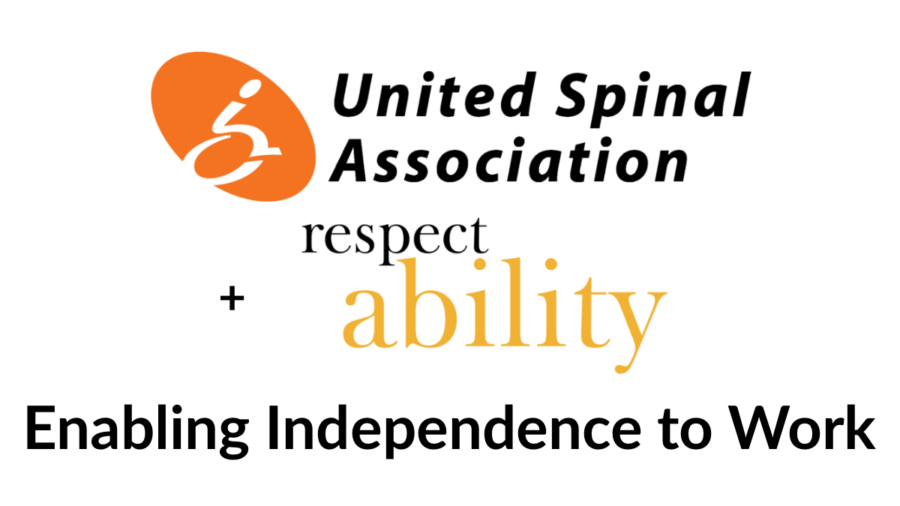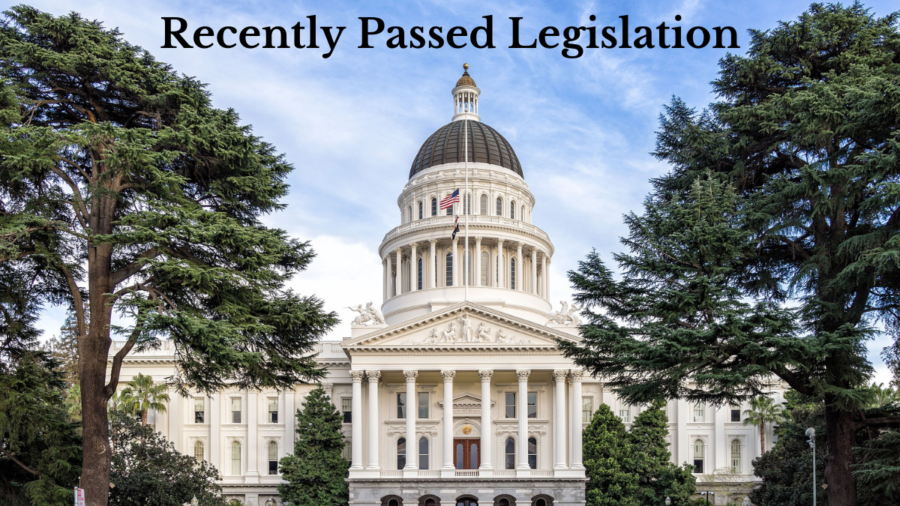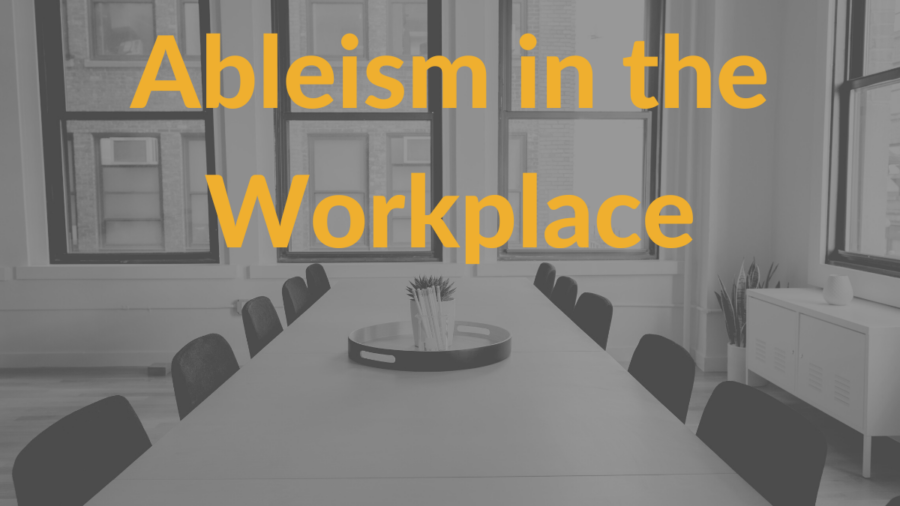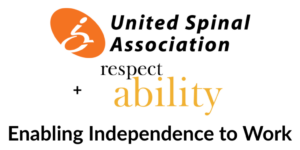 United Spinal Association and RespectAbility have embarked upon a major joint initiative to fundamentally change personal care for working people with disabilities by implementing market-driven solutions. The Enabling Independence to Work (EIW) program has designed a Medicaid buy-in model that will allow individuals with disabilities with personal care and complex medical needs to join the workforce. This program will be politically popular and economically feasible, as it will require substantial financial participation and still reward increased compensation. [continue reading…]
United Spinal Association and RespectAbility have embarked upon a major joint initiative to fundamentally change personal care for working people with disabilities by implementing market-driven solutions. The Enabling Independence to Work (EIW) program has designed a Medicaid buy-in model that will allow individuals with disabilities with personal care and complex medical needs to join the workforce. This program will be politically popular and economically feasible, as it will require substantial financial participation and still reward increased compensation. [continue reading…]
Policy
A Reflection on Being Singled Out While Voting

Erica Mones
As a Disabled woman, I dread voting. Polling places are supposed to be accessible to Disabled voters, but in my experience, they seldom are. For one, I do not have the fine motor skills to fill in the bubbles. As a result, I need assistance to fill out the ballot.
I’ve heard horror stories about Disabled voters relying on election workers–workers who loudly repeat the voters’ choice or workers who try to talk the voter into making a different choice. As a result, I ask my mom to help me. She respects my voting choices, even when we are not voting for the same candidate. The election workers often let me do this with no problem.
However, this year when I voted in the primary election, one of the workers loudly shouted, “No cheating!” as my mom helped me fill out the ballot. I felt like a child singled out by a teacher for utilizing the reasonable accommodations outlined in my IEP. I was humiliated and angry. I was exercising my right to vote like anyone else; I just have to go about it a bit differently. I tried to laugh it off, but the worker continued to make a scene, filling the previously peaceful room with his boisterous voice. He repeated himself, even though I heard him perfectly the first time. I was reminded at that moment that I was different – that our society and its conventions were not designed for me. I was an other. I am an other. [continue reading…]
Recently Passed Legislation Empowering Workers with Disabilities
Washington, DC, November 2 – National Disability Employment Awareness Month just wrapped up, but the work to get more people with disabilities into the workforce continues. Below, we are spotlighting recently passed legislation empowering workers with disabilities across the United States.
Gov. Newsom of California signed SB-951, AB-1041, AB-152, which have a combination of priorities that overlap to create room for Californians with disabilities. The new laws boost benefits for lower and middle-income Californians. They extend wage rates for family and disability leave for workers earning less than average wages, allowing them to make up to 90 percent of their salary. The laws also allow employees to pay sick or family leave to care for a designated family member, and extend COVID-19 supplemental sick leave through the end of 2022. [continue reading…]
Ableism in the Workplace
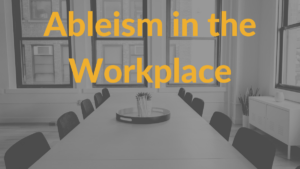 In the United States, workplace opportunities for people with disabilities have greatly expanded, and there’s more enlightenment toward people with disabilities. But there are still problems with ableism in the workplace.
In the United States, workplace opportunities for people with disabilities have greatly expanded, and there’s more enlightenment toward people with disabilities. But there are still problems with ableism in the workplace.
Outright scorn towards people with disabilities is not as commonplace as it was years ago when many states used to have ugliness laws during the late 1800s. These laws were used to discriminate against people with disabilities, especially physical disabilities, and they prevented disabled people from going out in public and getting jobs in almost any capacity. [continue reading…]
Employer Spotlight on P&G Global: A Road Less Traveled
P&G Global Ambassador, Employees with Disabilities and Medical Conditions: Raymond Lynch’s Journey Advances the Disability Community

Raymond Lynch
Raymond Lynch has always been an overachiever. Raised on a farm in Ireland, he worked hard and long hours in his youth. In college that same work ethic helped him to hold down multiple jobs while working towards a master’s degree in Biochemical Engineering. Upon earning his PhD, Raymond applied to a Research and Development position at P&G in Egham, England and immediately built on his achievements with a track record of delivering impact and results. He was on his way to a new role after he returned from a much-needed vacation. But his life—let alone his career—would never be the same.
In August 1998, Raymond and his wife planned a holiday to enjoy one of his favorite past times: riding motorcycles. Only three days into their journey, a car “jumped” a red traffic light and hit them head on. Raymond’s left leg was shattered, and worse yet, the next morning his wife noticed that he wasn’t making sense when talking. An emergency team was called in and in another challenging turn of events, his wife was soon after told that he was brain dead. Over the next two weeks, doctors asked Raymond’s wife to consider turning off his life support machine. She told them she could not. [continue reading…]
Making Work More Accessible Through Flexible Telework Policies
 As an employer, there are many ways you can improve the accessibility of your workplace for disabled workers, and one of the biggest is having flexible telework policies.
As an employer, there are many ways you can improve the accessibility of your workplace for disabled workers, and one of the biggest is having flexible telework policies.
For years, different groups within the disabled community have faced a range of problems with transportation, including being physically unable to drive, not having wheelchair accessible public transit options, having sensory issues that impair functioning when driving or riding public transportation, or being unable to afford the cost of transportation. Additionally, mental health conditions like depression and anxiety can deter individuals from leaving their homes, and for immunocompromised individuals, many work environments can increase risk of exposure to coworkers’ illnesses. [continue reading…]
Language Matters
“Your employees are the experts on their own needs. It’s time to listen.”
 Disability is a set of barriers that society places on people whose bodies work differently. While disability is an extension of the human experience and spectrum of human abilities, the stigma and negative expectations of the disabled body contribute to othering. Inclusive employer policies are an important aspect of the rehabilitation of disabled people into the workforce. Many disabled people are able and willing to work but face unsurmountable stigma and non-inclusive policies from employers.
Disability is a set of barriers that society places on people whose bodies work differently. While disability is an extension of the human experience and spectrum of human abilities, the stigma and negative expectations of the disabled body contribute to othering. Inclusive employer policies are an important aspect of the rehabilitation of disabled people into the workforce. Many disabled people are able and willing to work but face unsurmountable stigma and non-inclusive policies from employers.
In the English language, disability represents a set of impairments that are associated with a loss of social status – a perceived deviance of the body and its functions. The social model of disability describes the stigma faced by disabled individuals as profoundly linked to society’s expectations of the body. Alongside expectations of the body, stigma is associated with the inability to fulfill social norms. In individualist cultures, this can result in greater concern over an individual’s ability to contribute. Therefore, individualist cultures are going to place a larger emphasis on productivity expectations for the disabled body. [continue reading…]
RespectAbility Responds to Supreme Court’s Decision to Overturn Roe v. Wade
Washington, D.C., June 28 – On Friday, the United States Supreme Court reversed its almost 50-year position that the United States Constitution guarantees the right of people who are pregnant or may become pregnant to have autonomy over their own bodies and exercise the right to an abortion. Friday’s decision has and will continue to have a major impact on the disability community, and especially those within the community who are multiply marginalized.
RespectAbility is a diverse, disability-led nonprofit that works to create systemic change in how society views and values people with disabilities, and that advances policies and practices that empower people with disabilities to have a better future. Our mission is to fight stigmas and advance opportunities so people with disabilities can fully participate in all aspects of community. Self-determination and access to health care are crucial to ensuring that everyone in the disability community can fully access opportunities and have a better future. [continue reading…]
Building an Equitable Recovery: RespectAbility Advises Nebraska on Solutions for People with Disabilities
Lincoln, NE, June 10 – This week, the Nebraska Workforce Development Board met to discuss the status of workforce practices in the Cornhusker State. In response to this meeting, RespectAbility, a national, nonpartisan nonprofit organization, submitted testimony on how to implement best practices, advocate for greater inclusion and improve the standing of people with disabilities in the workforce.
“When it was passed with broad, bipartisan support in 2014, the Workforce Innovation and Opportunity Act (WIOA) invested unprecedented resources into efforts to get people with barriers to employment into the labor force,” said Ollie Cantos, RespectAbility’s Chairman. “Now, after the pandemic that has reshaped our economy, it is time to devote significant attention to supporting the economic advancement of students, job-seekers, and entrepreneurs with disabilities.”
There are more than 110,000 working age (18-64) Nebraskans living with some form of disability. Before the pandemic, 50.8 percent of the working age population of people with disabilities were employed. It is critical that Nebraska’s Workforce Development Board listen to the individuals with disabilities and advocates impacted by these unemployment rates. In order to make the workforce more inclusive, and to find practical ways to make the workforce more accessible for the entire population, RespectAbility collects, summarizes, and publicizes ideas on key workforce solutions. To learn more about RespectAbility’s advocacy work, please visit our Policy website. [continue reading…]
Building an Equitable Recovery: RespectAbility Advises Oklahoma on Solutions for People with Disabilities
Oklahoma City, OK, April 28 – This week, the Governor’s Council for Workforce and Economic Development (GCWED) met to discuss the status of workforce practices in Oklahoma. In response to this meeting, RespectAbility, a national, nonpartisan nonprofit organization, submitted testimony on how to implement best practices, advocate for greater inclusion and improve the standing of people with disabilities in the workforce.
“When it was passed with broad, bipartisan support in 2014, the Workforce Innovation and Opportunity Act (WIOA) invested unprecedented resources into efforts to get people with barriers to employment into the labor force,” said Olegario “Ollie” Cantos VII, RespectAbility’s Chairman. “Now, after the pandemic that has reshaped our economy, it is time to devote significant attention to supporting the economic advancement of students, job-seekers, and entrepreneurs with disabilities.”
There are more than 373,359 working age (18-64) Oklahomans living with some form of disability. Before the pandemic, 37.8 percent of the working age population of people with disabilities were employed. It is critical that Oklahoma’s Workforce Development Board listen to the individuals with disabilities and advocates impacted by these unemployment rates. In order to make the workforce more inclusive, and to find practical ways to make the workforce more accessible for the entire population, RespectAbility collects, summarizes, and publicizes ideas on key workforce solutions. To learn more about RespectAbility’s advocacy work, please visit our Policy website. [continue reading…]


